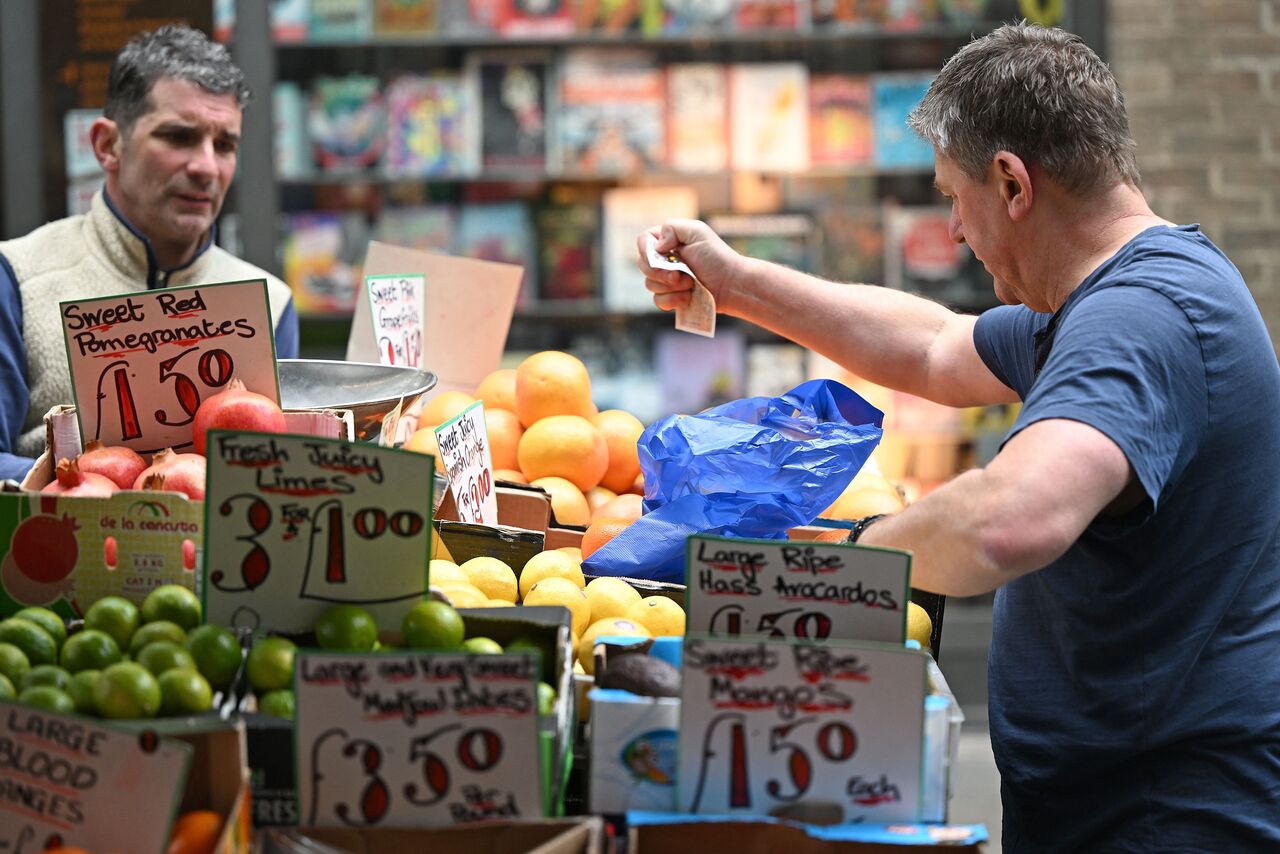Rising global food protectionism risks worsening inflation
Sign up now: Get ST's newsletters delivered to your inbox

A customer paying for fruit and vegetables at a trader's market stall in London on May 12, 2022.
PHOTO: AFP
SINGAPORE (BLOOMBERG) - Food protectionism is on the rise in the developing world as governments try to safeguard local supplies, and the effects are threatening to spill over into richer economies.
Countries are restricting exports to cope with high prices that have been exacerbated by the war in Ukraine. Malaysia just announced a ban on chicken exports, causing consternation in Singapore, which gets a third of its supplies from there.
India has moved to curb wheat and sugar shipments, Indonesia has limited palm oil sales, and some other nations have issued grain quotas.
India has moved to curb wheat and sugar shipments, Indonesia has limited palm oil sales, and some other nations have issued grain quotas.
The poorest countries are most vulnerable to surging food prices and shortages, but wealthier economies are not immune. For example, almost 10 million Britons cut back on food in April amid a cost-of-living crisis. US restaurants are shrinking the size of their portions, while France has pledged to issue food vouchers to some households.
Around 30 countries have taken steps to restrict food exports since the start of the war in Ukraine, with agricultural protectionism at the highest level since the food price crisis in 2007 and 2008, said Ms Sabrin Chowdhury, head of commodities at Fitch Solutions.
"Protectionism will definitely continue in 2022 and rise in the coming months, exacerbating food security risks for the world's most vulnerable," she added.
A United Nations gauge of world food prices has jumped more than 70 per cent since mid-2020 and is near a record after the invasion of Ukraine choked off crop exports and rattled supply chains.
More food protectionism could push costs even higher, further hurting consumer purchasing power and creating headaches for central banks trying to curb inflation while maintaining growth.
More food protectionism could push costs even higher, further hurting consumer purchasing power and creating headaches for central banks trying to curb inflation while maintaining growth.
The risks are skewed towards more food protectionism in Asia, said Ms Sonal Varma, chief economist for India and Asia ex-Japan at Nomura Holdings. That could exacerbate price pressures globally, she added.
In the latest example of protectionist measures in the region, India is set to cap sugar exports at 10 million tonnes for the market year that runs through September.
German Agriculture Minister Cem Oezdemir said earlier this month that he and his Group of Seven counterparts had discussed “with concern” India’s move to halt wheat exports and Indonesia’s restrictions on palm oil.
German Agriculture Minister Cem Oezdemir said earlier this month that he and his Group of Seven counterparts had discussed “with concern” India’s move to halt wheat exports and Indonesia’s restrictions on palm oil.
Many restrictions
“Lower-income households in the UK and the US are struggling to feed themselves,” said Assistant Professor Sonia Akter, who specialises in agriculture at the Lee Kuan Yew School of Public Policy at the National University of Singapore. Rising prices “will disproportionately affect poor people who spend a large share of their income on food”, she added.
Some of the most important staples have become a lot more expensive. Benchmark wheat futures have surged 56 per cent this year, palm oil has risen 38 per cent, while a UN gauge of dairy prices prices is up 14 per cent.
Export restrictions are not just bad news for importing countries. They also penalise farmers in the producing nations by stopping them from taking advantage of high international prices, said Dr David Adamson, a senior lecturer at the Centre for Global Food and Resources at the University of Adelaide.
"Protectionism is the worst thing to do for food security as it prevents the markets from working to smooth things out," he said.


